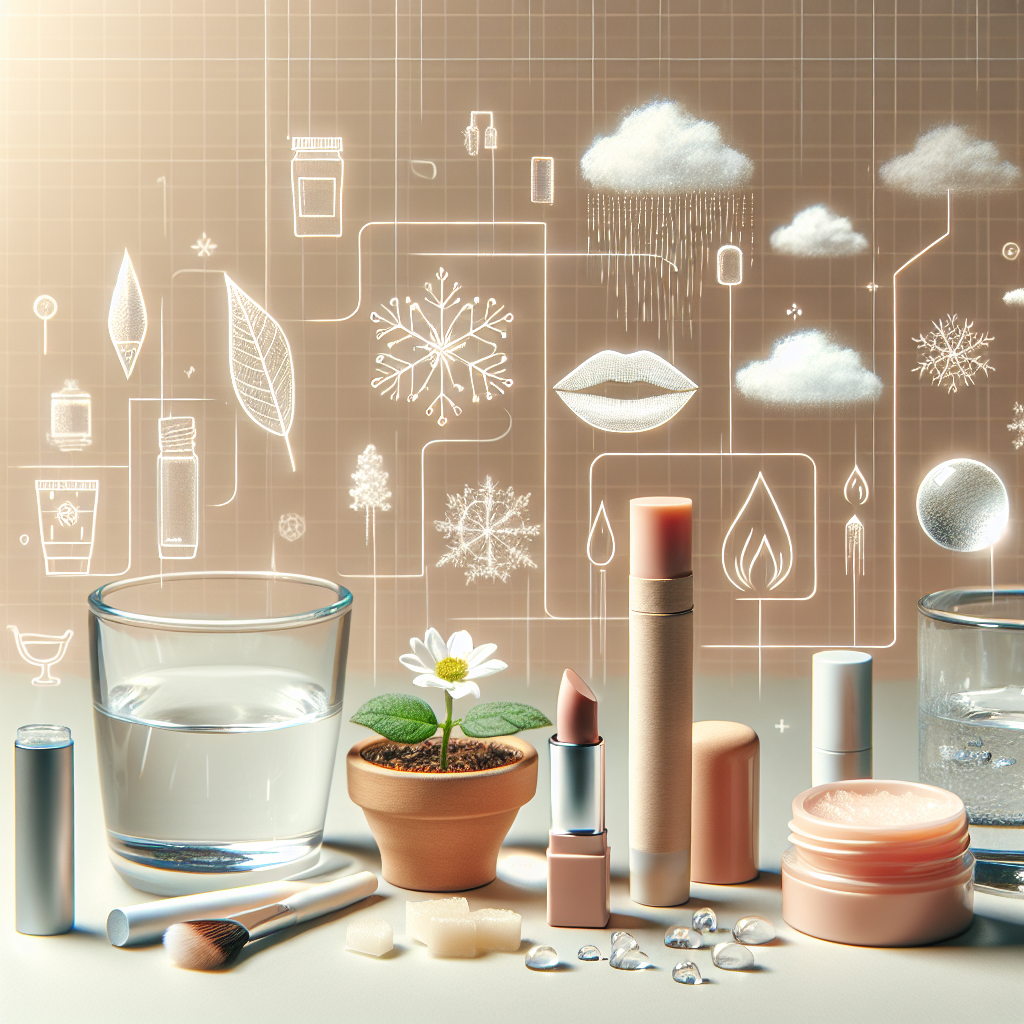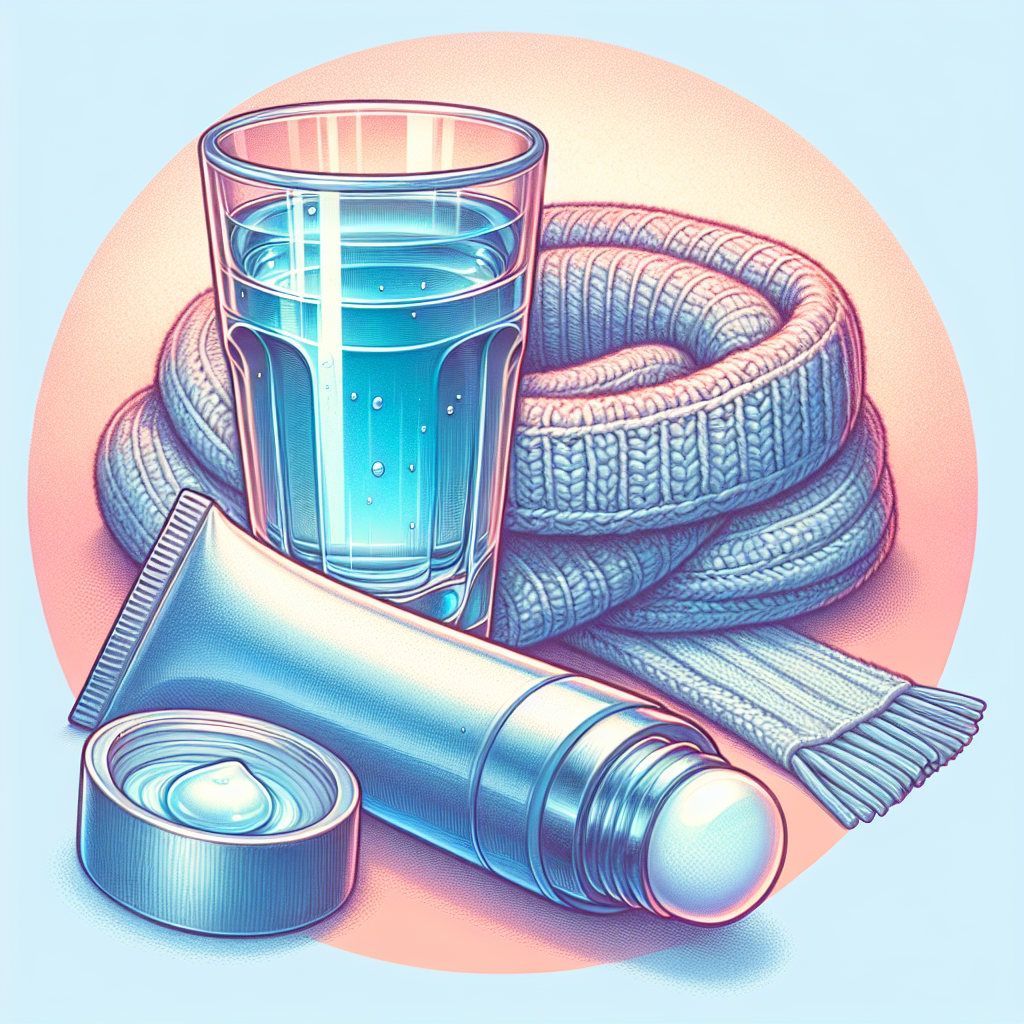Have you ever wondered how to prevent and treat chapped lips? This common issue can be uncomfortable and unsightly, but fear not, because I have some helpful tips for you. Whether it’s the harsh winter weather or excessive lip licking, chapped lips can be a bother. In this article, we will explore some easy preventative measures you can take, as well as effective treatments to soothe and heal your lips. So, say goodbye to dry, cracked lips, and hello to a smooth and moisturized pout!
Causes of Chapped Lips
Dehydration
One of the main causes of chapped lips is dehydration. When your body lacks sufficient hydration, it affects all parts of your body, including your lips. Dehydration can cause your lips to become dry, cracked, and uncomfortable. To prevent dehydration, make sure to drink an adequate amount of water throughout the day.
Lack of proper lip care
Another common cause of chapped lips is a lack of proper lip care. Many people neglect to give their lips the attention they deserve, which can lead to dryness and chapping. It is important to regularly moisturize and protect your lips to keep them healthy and prevent them from becoming chapped.
Weather conditions
The weather can also play a significant role in the development of chapped lips. Cold, dry weather can strip the moisture from your lips, leaving them vulnerable to dryness and cracking. In addition, exposure to wind can further exacerbate the problem. It is essential to protect your lips from harsh weather conditions by covering them with a scarf or using a lip balm with SPF.
Excessive licking of lips
Although it may seem like licking your lips can provide temporary relief, it can actually worsen the problem. When you lick your lips, the saliva evaporates quickly, leaving your lips even drier than before. Furthermore, the enzymes present in saliva can irritate and damage the delicate skin on your lips, leading to chapping.
Allergic reactions
Allergies can also cause chapped lips. Certain allergens, such as certain foods, medications, or cosmetics, can trigger an allergic reaction that affects the lips. This can result in inflammation, dryness, and chapping. If you suspect that your chapped lips are due to an allergic reaction, it is important to identify and avoid the allergen causing the problem.
Prevention Tips
Stay hydrated
To prevent chapped lips, it is crucial to stay hydrated. Make sure to drink an adequate amount of water throughout the day. Dehydration can dry out your lips, so keeping your body properly hydrated will help maintain the moisture levels in your lips.
Use a humidifier
If you live in a dry climate or during the winter months when the air tends to be drier, using a humidifier can help add moisture to the air and prevent your lips from drying out. Place a humidifier in your bedroom or any other rooms you spend a significant amount of time in to keep the air moist.
Protect your lips
Protecting your lips from harsh weather conditions is key to preventing chapping. During the cold winter months, make sure to cover your lips with a scarf or a lip balm with SPF. In the summer, wear a lip balm with SPF to shield your lips from the sun’s harmful rays.
Avoid lip-licking
As mentioned earlier, excessive lip-licking can actually worsen the problem of chapped lips. Instead of licking your lips when they feel dry, apply a moisturizing lip balm to provide the necessary hydration. Breaking the habit of lip-licking will help your lips stay moist and prevent chapping.
Avoid triggers
If you have identified any specific triggers that cause your lips to become chapped, such as certain foods or cosmetics, it is important to avoid them. Pay attention to what you eat or apply to your lips and notice if there are any patterns of dryness or chapping. By avoiding these triggers, you can prevent chapped lips.

Home Remedies for Chapped Lips
Drink water
One of the simplest and most effective home remedies for chapped lips is staying hydrated from within. By drinking an adequate amount of water throughout the day, you can help keep your lips moisturized. Water hydrates your body and helps maintain the moisture balance in your lips, preventing them from drying out.
Apply lip balm
Applying a moisturizing lip balm is essential for keeping your lips hydrated and preventing chapping. Look for lip balms that contain hydrating ingredients such as shea butter, coconut oil, or beeswax. Apply the lip balm regularly throughout the day to provide continuous moisture and protection for your lips.
Use natural oils
Natural oils, such as coconut oil or almond oil, can be used to moisturize and nourish your lips. These oils are rich in fatty acids and have emollient properties that help soothe and heal chapped lips. Simply apply a small amount of oil to your lips and gently massage it in.
Try a honey and sugar scrub
A gentle exfoliation with a homemade honey and sugar scrub can help remove dead skin cells from your lips and promote healing. Mix equal parts honey and sugar to create a paste, and then gently rub it onto your lips in circular motions. Rinse off the scrub and apply a moisturizing lip balm afterwards.
Apply aloe vera gel
Aloe vera gel is known for its soothing and moisturizing properties. Applying a small amount of aloe vera gel to your lips can help alleviate dryness and promote healing. Look for a pure aloe vera gel or extract, and apply it to your lips whenever they feel dry or chapped.
Over-the-Counter Treatments
Petroleum jelly
Petroleum jelly is a popular over-the-counter treatment for chapped lips. It forms a protective barrier on your lips, preventing moisture loss and promoting healing. Apply a thin layer of petroleum jelly to your lips regularly throughout the day to keep them hydrated and protected.
Lip balms with SPF
Using a lip balm with SPF is crucial, especially during sunny days or when participating in outdoor activities. Sun exposure can further dry out your lips and cause damage. Look for a lip balm that offers both hydration and sun protection to keep your lips moisturized and shielded from the sun’s harmful UV rays.
Hydrocortisone cream
If your chapped lips are accompanied by inflammation or redness, applying a hydrocortisone cream can help reduce the inflammation and relieve discomfort. However, it is important to use hydrocortisone cream sparingly and only as directed, as prolonged use can have side effects.
Topical ointments
There are several topical ointments available over-the-counter that are specifically designed to treat chapped lips. These ointments often contain ingredients such as menthol or camphor, which provide a cooling sensation and help alleviate dryness and discomfort. Follow the instructions provided on the packaging for the best results.

Medical Treatments for Chapped Lips
Prescription ointments
In severe cases of chapped lips that do not respond to home remedies or over-the-counter treatments, a dermatologist may prescribe a stronger ointment or medication. These prescription ointments typically contain ingredients like corticosteroids or antibiotics that can help heal chapped lips and address underlying causes.
Exfoliating treatments
If your chapped lips are due to a buildup of dead skin cells, your dermatologist may recommend an exfoliating treatment. This can involve using a gentle lip scrub or receiving a professional exfoliating treatment. Exfoliating helps remove the dead skin cells and allows new, healthy cells to surface.
Laser therapy
In some cases, laser therapy may be used to treat chapped lips. This treatment uses laser technology to stimulate collagen production and promote healing. Laser therapy can help rejuvenate the lips, improving their appearance and reducing dryness and cracking.
Dermal fillers
For individuals with severe chapped lips or those looking to enhance the fullness of their lips, dermal fillers may be an option. These fillers help add volume and hydration to the lips, resulting in a smoother and more moisturized texture. Consult with a qualified dermatologist or cosmetic surgeon to determine if this treatment is suitable for you.
When to See a Doctor
Persistent symptoms
If your chapped lips persist despite following preventive measures and using over-the-counter treatments, it may be a sign of an underlying condition. It is best to consult a doctor or dermatologist to determine the cause of your persistent symptoms and receive appropriate treatment.
Severe pain or bleeding
If your chapped lips are accompanied by severe pain or bleeding, it is important to seek medical attention promptly. This could be a sign of a more serious condition or infection that requires professional evaluation and treatment.
Infections
In some cases, chapped lips can become infected. If you notice symptoms such as pus, swelling, or an increasing amount of pain, it is vital to see a doctor. They will be able to diagnose and prescribe appropriate treatment for the infection.
Allergic reactions
If you suspect that your chapped lips are the result of an allergic reaction to a certain product or substance, it is crucial to seek medical advice. Your doctor can perform tests to identify the allergen and provide guidance on how to avoid it in the future.

Preventing Chapped Lips in Different Seasons
Winter
During the winter season, the cold and dry weather can be particularly harsh on your lips. To prevent chapped lips in winter, make sure to cover them with a scarf or a facial mask when going outside. Use a humidifier indoors to add moisture to the air and apply a thick, hydrating lip balm regularly.
Summer
In the summer, excessive sun exposure and heat can dehydrate your lips. To prevent chapped lips in summer, wear a lip balm with SPF to protect against the sun’s harmful rays. Make sure to reapply the lip balm frequently, especially after swimming or sweating. Drink plenty of water to stay hydrated.
Spring
Springtime can bring fluctuating weather conditions, including both dry spells and rainy days. To prevent chapped lips in spring, continue moisturizing your lips with a hydrating lip balm. Be mindful of allergens that may trigger a reaction and avoid them if necessary. Stay hydrated and consider using a humidifier if the air becomes too dry.
Autumn
Autumn can bring cooler temperatures and drier air, which can lead to chapped lips. To prevent chapped lips in autumn, continue using lip balms with hydrating properties. Dress warmly and protect your lips from wind and cold weather by covering them with a scarf or a lip balm with SPF.
Lifestyle Changes for Healthy Lips
Quit smoking
Smoking not only affects your overall health but also takes a toll on your lips. The chemicals and heat from smoking can contribute to dryness and chapping. Quitting smoking can significantly improve the health of your lips and prevent future problems.
Limit caffeine and alcohol
Caffeine and alcohol can have a dehydrating effect on the body, including your lips. Limiting your consumption of these substances can help keep your lips hydrated and prevent them from becoming chapped. Opt for water or herbal teas as healthier alternatives.
Practice good oral hygiene
Maintaining good oral hygiene is not only important for your teeth and gums but also for your lips. Brush your teeth regularly, including your lips, to remove any dead skin cells and keep your lips clean. Additionally, consider using a soft-bristled toothbrush to gently exfoliate your lips.
Eat a balanced diet
A healthy diet rich in essential nutrients is beneficial for your overall well-being, including the health of your lips. Include foods that are high in vitamins A, C, and E, as well as omega-3 fatty acids. These nutrients can help nourish and protect your lips from dryness and damage.

The Importance of Sun Protection
Wear lip balm with SPF
Protecting your lips from the sun’s harmful UV rays is crucial for preventing chapped lips and reducing the risk of lip cancer. Make sure to wear a lip balm with SPF every day, even on cloudy or overcast days. Look for a lip balm with broad-spectrum SPF and reapply frequently, particularly after eating or drinking.
Use sun-protective clothing
In addition to wearing lip balm with SPF, it is important to protect your lips from the sun by wearing sun-protective clothing. Wide-brimmed hats or caps can provide shade for your face and lips, reducing sun exposure and preventing chapping.
Seek shade during peak hours
To minimize sun exposure and prevent your lips from becoming dry and chapped, seek shade during peak hours when the sun’s rays are the strongest. This is typically between 10 am and 4 pm. If you must be outdoors during these hours, make sure to wear sun-protective clothing and reapply lip balm with SPF frequently.
Conclusion
Chapped lips can be uncomfortable and unsightly, but they can be prevented and treated with proper care. By staying hydrated, protecting your lips from harsh weather conditions, and practicing good lip care habits, you can maintain soft, moisturized lips. If home remedies and over-the-counter treatments are not effective, consult with a healthcare professional for further evaluation and treatment. Make sun protection a priority to prevent damage to your lips and reduce the risk of lip cancer. With the right preventative measures and care, you can enjoy healthy and hydrated lips year-round.






